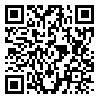BibTeX | RIS | EndNote | Medlars | ProCite | Reference Manager | RefWorks
Send citation to:
URL: http://jms.thums.ac.ir/article-1-55-en.html
Background: The optimal growth of children is dependent
on proper nutrition and eating habits. If proper child nutrition and diet is
the optimal child health is provided. It is important that children are fed
according to the most sensitive and vulnerable groups in society against
malnutrition and food insecurity form.
This study aimed to determine the level of knowledge and perceived benefits and
perceived barriers to primary school students in relation Torbat heydariyeh
breakfast and snacks were conducted at 92 academic yea
Materials and Methods:
In this descriptive-analytical study 180 elementary grade students were
selected by multi-stage sampling. The data collection instrument was a
questionnaire that its validity and reliability were reviewed and confirmed.
The collected data were analyzed by SPSS software and statistical
independent T, one way ANOVA and Pearson test.
Results: The results showed
that 45.6 percent of students ate breakfast every day and only 22.5 percent ate
snack every day. Pearson test showed that the relationship between Knowledge
and behavior perceived susceptibility and severity and behavior is positive and
significant but this the relationship was not observed between perceived
benefits and the behavior.
Conclusion: In
this study was determined that behavior of students especially in breakfast and
snack consumption is not desirable and according to the direct relationship
between knowledge and perceived severity with behavior, can improve nutritional
behavior of students through various educational programs and also work with
the current models in health education, including the Health Belief Model
(which susceptibility and perceived severity are components of this model).
Received: 2014/05/11 | Accepted: 2014/05/11 | Published: 2014/05/11
| Rights and permissions | |
 | This work is licensed under a Creative Commons Attribution-NonCommercial 4.0 International License. |





